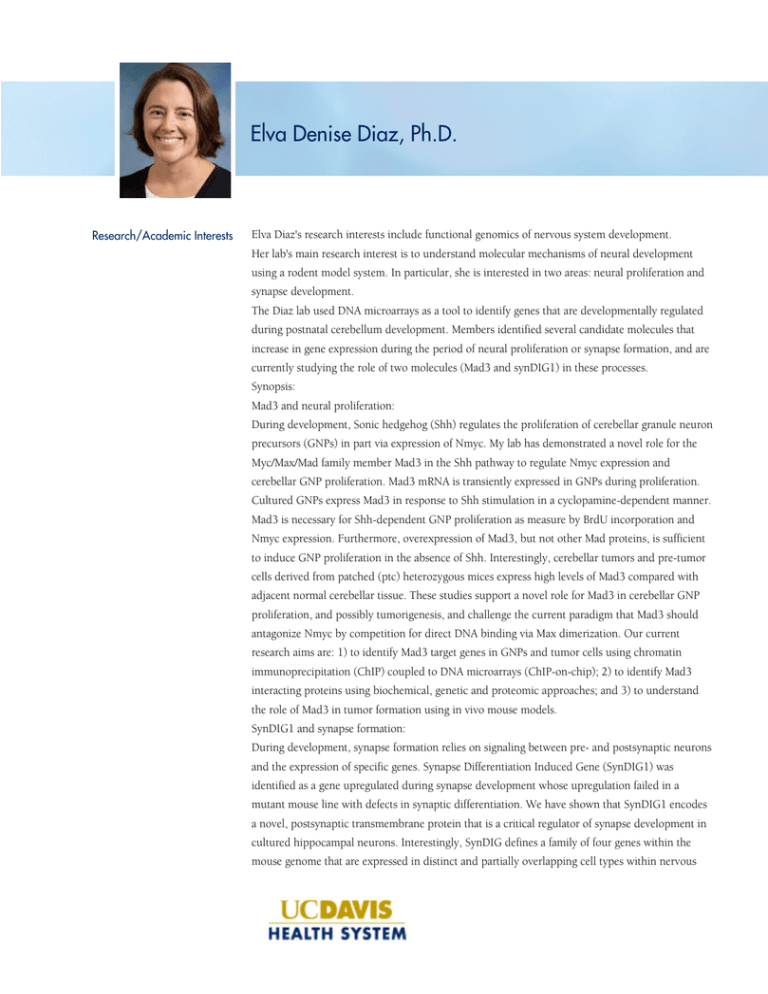Elva Denise Diaz, Ph.D.
advertisement

Elva Denise Diaz, Ph.D. Research/Academic Interests Elva Diaz's research interests include functional genomics of nervous system development. Her lab's main research interest is to understand molecular mechanisms of neural development using a rodent model system. In particular, she is interested in two areas: neural proliferation and synapse development. The Diaz lab used DNA microarrays as a tool to identify genes that are developmentally regulated during postnatal cerebellum development. Members identified several candidate molecules that increase in gene expression during the period of neural proliferation or synapse formation, and are currently studying the role of two molecules (Mad3 and synDIG1) in these processes. Synopsis: Mad3 and neural proliferation: During development, Sonic hedgehog (Shh) regulates the proliferation of cerebellar granule neuron precursors (GNPs) in part via expression of Nmyc. My lab has demonstrated a novel role for the Myc/Max/Mad family member Mad3 in the Shh pathway to regulate Nmyc expression and cerebellar GNP proliferation. Mad3 mRNA is transiently expressed in GNPs during proliferation. Cultured GNPs express Mad3 in response to Shh stimulation in a cyclopamine-dependent manner. Mad3 is necessary for Shh-dependent GNP proliferation as measure by BrdU incorporation and Nmyc expression. Furthermore, overexpression of Mad3, but not other Mad proteins, is sufficient to induce GNP proliferation in the absence of Shh. Interestingly, cerebellar tumors and pre-tumor cells derived from patched (ptc) heterozygous mices express high levels of Mad3 compared with adjacent normal cerebellar tissue. These studies support a novel role for Mad3 in cerebellar GNP proliferation, and possibly tumorigenesis, and challenge the current paradigm that Mad3 should antagonize Nmyc by competition for direct DNA binding via Max dimerization. Our current research aims are: 1) to identify Mad3 target genes in GNPs and tumor cells using chromatin immunoprecipitation (ChIP) coupled to DNA microarrays (ChIP-on-chip); 2) to identify Mad3 interacting proteins using biochemical, genetic and proteomic approaches; and 3) to understand the role of Mad3 in tumor formation using in vivo mouse models. SynDIG1 and synapse formation: During development, synapse formation relies on signaling between pre- and postsynaptic neurons and the expression of specific genes. Synapse Differentiation Induced Gene (SynDIG1) was identified as a gene upregulated during synapse development whose upregulation failed in a mutant mouse line with defects in synaptic differentiation. We have shown that SynDIG1 encodes a novel, postsynaptic transmembrane protein that is a critical regulator of synapse development in cultured hippocampal neurons. Interestingly, SynDIG defines a family of four genes within the mouse genome that are expressed in distinct and partially overlapping cell types within nervous Elva Denise Diaz, Ph.D. system tissues. Intriguingly, overexpression or knock-down of synDIG1 in cultured neurons alters the electrophysiological properties of excitatory synaptic transmission, presumably by the altered trafficking of AMPA receptors. Our current research aims are: 1) to characterize mice with a conditional deletion of the SynDIG1 gene; 2) to identify SynDIG1-interacting proteins; and 3) to test if SynDIG1 is subject to activity-dependent regulation at synapses. Recent/Current Research Funding: National Institutes of Health National Science Foundation Title Specialty Associate Professor Pharmacology, Cancer, Neuroscience Department Pharmacology Division Pharmacology Center/Program Affiliation Center for Neuroscience Genome Center UC Davis Comprehensive Cancer Center Address/Phone Genome and Biomedical Sciences Building, Genome & Biomedical Sciences Facility, 451 Health Sciences Drive Suite 3503 Davis, CA 95616 Phone: 530-752-3200 Additional Phone Email Languages Education Phone: 530-754-6080 ediaz@ucdavis.edu Spanish Ph.D., Stanford University, Stanford CA 1999 B.A., Harvard University, Cambridge MA 1993 Professional Memberships American Society for Cell Biology Society for Advancement of Chicanos and Native Americans in Science Society for Neuroscience Honors and Awards Merck & Co., Massachusetts General Hospital Research Award, 1993 National Science Foundation Award, Harvard University, Cambridge, MA, 1992 Elva Denise Diaz, Ph.D. NIH Director's New Innovator Award Alfred P. Sloan Research Fellowship Helen Hay Whitney Fellowship Select Recent Publications To view a detailed list of Dr. Diaz's publications, please click here. © 2016 UC Regents




